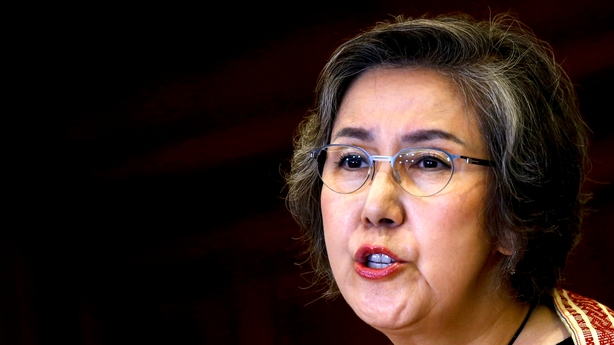Myanmar has urged Muslims in the troubled northwest to cooperate in the search for insurgents, whose coordinated attacks on security posts and an army crackdown have led to one of the deadliest bouts of violence to engulf the Rohingya community in decades.
Aid agencies estimate about 73,000 Rohingya have fled into neighbouring Bangladesh from Myanmar since violence erupted last week.
Hundreds more refugees walked through rice paddies from the Naf river separating the two countries into Bangladesh today, straining scarce resources of aid groups and local communities already helping tens of thousands.
The clashes and military counteroffensive have killed nearly 400 people during the past week.The treatment of Buddhist-majority Myanmar's roughly 1.1 million Muslim Rohingya is the biggest challenge facing leader Aung San Suu Kyi, accused by Western critics of not speaking out for the minority that has long complained of persecution.
UN Special Rapporteur on Myanmar Yanghee Lee interview with RTÉ's This Week

Asked if the UN expects better from Aung San Suu Kyi:
"I join many who are disappointed. We’ve been waiting for her to step up, because you know the challenges she inherited were huge and she had asked the international community to give her time and I think people’s patience are wearing out".
On whether there is a government campaign to target Rohingya:
"Judging by the sequence of events that has followed since a few decades ago and more recently since 2012, it would be very easy to come to that conclusion".
On whether it constitutes ethnic cleansing:
"Not yet. There are judicial steps which need to be taken to make that final decision, but we can say and I have said that these allegations and these events can easily amount to crimes against humanity"
On raising her concerns with the Myanmar government:
"I was very robust and raised my voice on this. But repeatedly I get this (response) 'Oh no, they burnt their own houses, these are all fabrications, lies etc, etc'. Either it seems like the authorities are denying the truth or they were trying to brush it off as nothing important".
On growing extremism:
"It can and it will go beyond the borders of Rakhine [if the conflict is not addressed immediately] and then it will be our problem, your problem, all of us collectively. I visit Myanmar every six months. The situation [in Rakhine] has deteriorated. These people have been discriminated against for so long in law and in policy and when people get desperate they will choose to take really radical actions."
Turkish President Tayyip Erdogan said on Friday that violence against Muslims amounted to genocide.
It marks a dramatic escalation of a conflict that has simmered since October, when a smaller Rohingya attack on security posts prompted a military response dogged by allegations of rights abuses.
"Islamic villagers in northern Maungtaw have been urged over loudspeakers to cooperate when security forces search for Arakan Rohingya Salvation Army (ARSA) extremist terrorists, and not to pose a threat or brandish weapons when security forces enter their villages," the state-run Global New Light of Myanmar said today.
ARSA has been declared a terrorist organisation by the government.
The group claimed responsibility for coordinated attacks on security posts last week.
In Maungni village in northern Rakhine, villagers earlier this week caught two ARSA members and handed them over to the authorities, the newspaper added.
The army wrote in a Facebook post today that Rohingya insurgents had set fires to monasteries, images of Buddha as well as schools and houses in northern Rakhine.
More than 200 buildings, including houses and shops, were destroyed across several villages, the army said.
While Myanmar officials blamed the ARSA for the burning of the homes, Rohingya fleeing to Bangladesh and human rights watchers say a campaign of arson and killings by the army is aimed at trying to force the minority group out.
More than 11,700 "ethnic residents" had been evacuated from northern Rakhine, the government has said, referring to non-Muslims.
In Bangladesh, authorities said at least 53 bodies of Rohingya had either been found floating in the Naf river or washed up on the beach in the past week, as tens of thousands continue to try to flee the violence.
A senior leader of al-Qaeda's Yemeni branch has called for attacks on Myanmar authorities in support of the Rohingya.
Former colonial ruler Britain said yesterday it hoped Ms Suu Kyi would use her "remarkable qualities" to end the violence.

